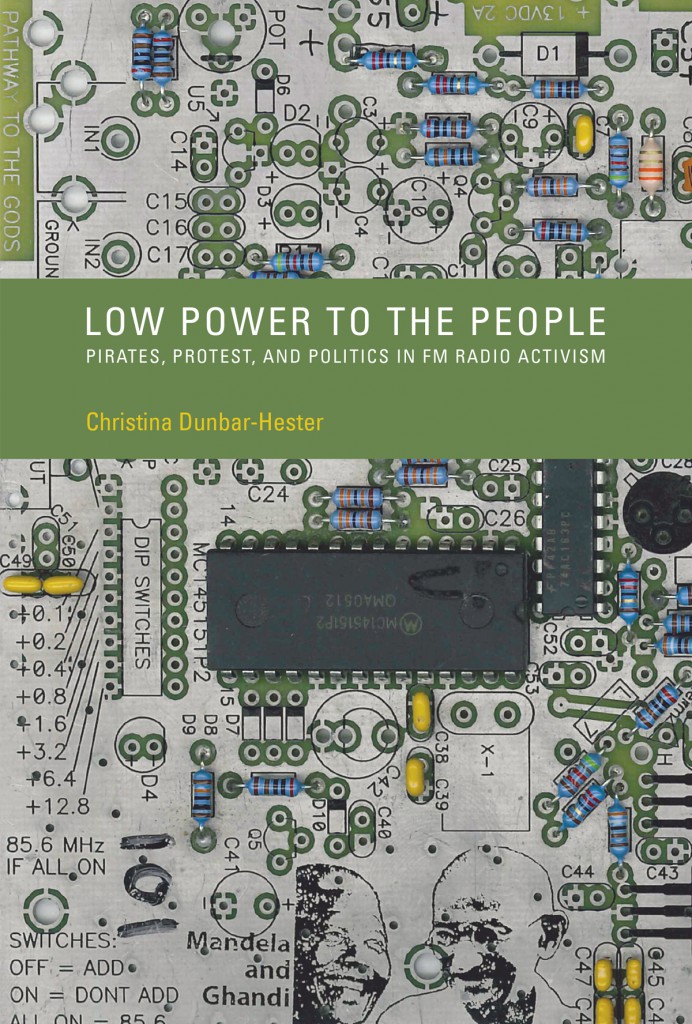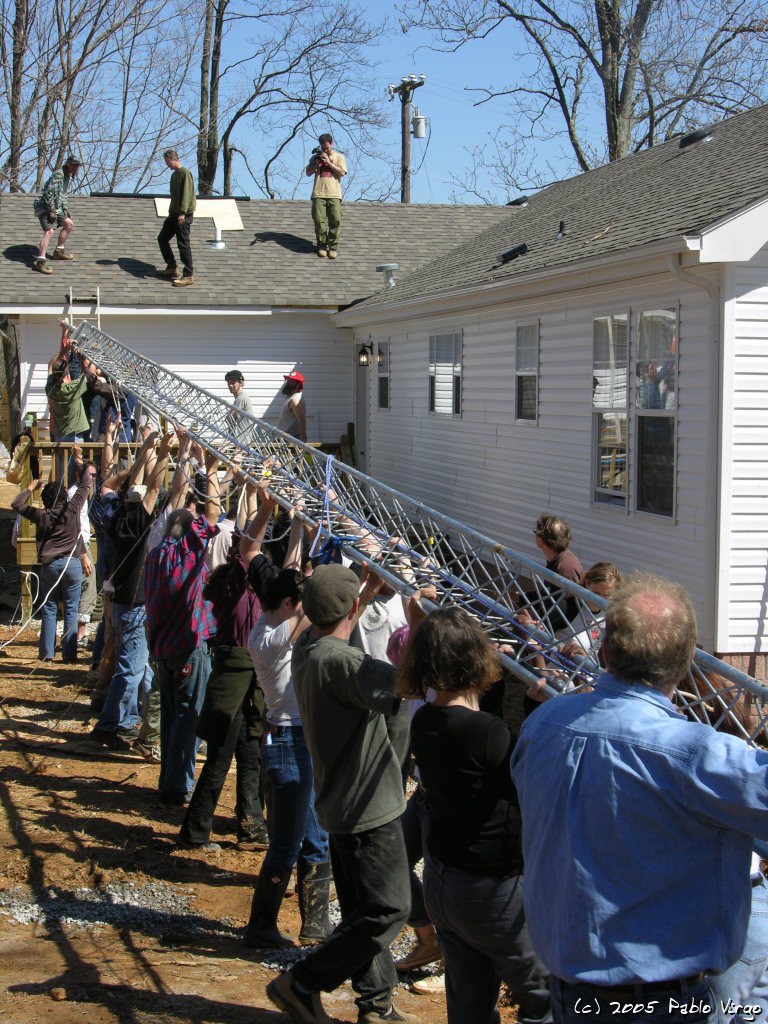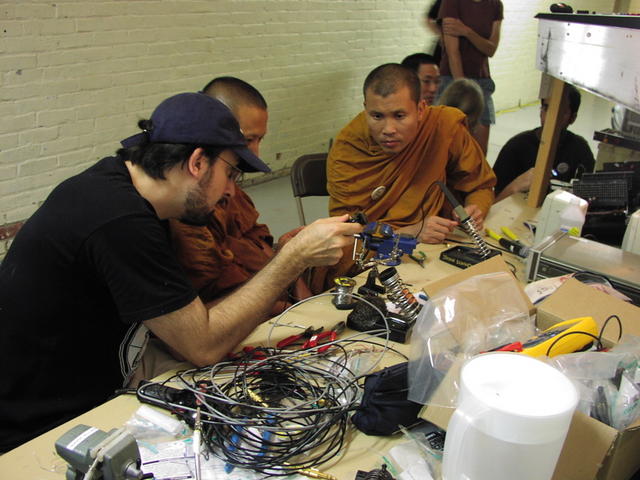Low Power FM Radio: A Conversation with Christina Dunbar-Hester and Sanjay Jolly
 The following is a dialogue between Christina Dunbar-Hester and Sanjay Jolly about the state of radio activism and Dunbar-Hester’s recent book, Low Power to the People: Pirates, Politics, and Protest in FM Radio Activism (MIT Press, 2014).
The following is a dialogue between Christina Dunbar-Hester and Sanjay Jolly about the state of radio activism and Dunbar-Hester’s recent book, Low Power to the People: Pirates, Politics, and Protest in FM Radio Activism (MIT Press, 2014).
Christina Dunbar-Hester (CDH) researches the politics of technology in activism. She will join the Annenberg School for Communication and Journalism at the University of Southern California in spring 2016. Her book, Low Power to the People, is an ethnographic account of radio activism.
Sanjay Jolly (SJ) was formerly the policy director at the Prometheus Radio Project, a Philadelphia-based media advocacy organization that, as stated in its mission, “builds participatory radio as a tool for social justice organizing and a voice for community expression.”
SJ: Why did you choose to study the Prometheus Radio Project and radio activism?
CDH: My initial motivation for research on radio activism was not mainly due to an interest in radio, per se—I was interested in discourses about digitality and the Internet being “all new,” with which the 1990s were saturated. When I found out about people advocating for radio even though they were highly sophisticated about technology–in other words who were not Luddites–I thought that would be an interesting site to interrogate the interplay between “old” media and “new” media. I was interested in ideas about how communication and technology might be changing, but I did not want to look at those topics in a novelty-focused vacuum.
SJ: What was the political situation around community radio activism at the moment of the book?
CDH: The period of my fieldwork was the mid-2000s. The earliest LPFM stations had been on the air a few years at that point, so LPFM was no longer brand-new, but advocates were still pursuing changes in policy that would allow many more LPFMs to be licensed. That goal was met in late 2010 with the passage of the Community Radio Act, finally. But those middle years were challenging—advocates approached Congress several times, in a variety of ways, but the legislative change to allow more LPFMs was slow and elusive. This was frustrating in certain ways because the introduction of LPFM in 2000 was a high point for media democracy activism, and advocates wanted to see that momentum carried forward.
SJ: Why did you choose to do an ethnography?
CDH: I have always been interested in how people make meaning out of their activities—what motivates any of us to do the things we do? How does meaning for individuals and at the level of groups get shaped, or change? These are extremely important questions for activism, I think: with limited resources of time (among other things), how do people choose which issues are important, and what strategies to pursue in order to enact social change? A question in my research is, what role does technology play in activist imaginaries, and why? Also, a lot of radio studies work is historical, and I wanted to complement and extend that work with contemporary research.
SJ: What surprised you most as you were conducting your research?
CDH: One of the things that surprised me was how much the activists struggled with preexisting cultural notions surrounding technology. Radio activists themselves were very enthusiastic about promoting tech skills and DIY to all kinds of different people. They had a strong and sincere egalitarian bent, and trying to teach tech skills to people who had traditionally been excluded from this domain was presented as a radical opportunity to change those power relations. But what often happened was that the activists were swimming upstream to promote tech skills and DIY across gender, race, and class lines. I wound up writing about the persistence of these difficulties, which was in some ways unexpected because of how sincere the activists were about demystifying technology “for everyone.”

Prometheus-sponsored “barnraising” at WRFN-LP in Nashville, TN, in 2005. (Photo: Prometheus Radio Project)
SJ: Discuss how your activism played a role in your research.
CDH: As I write in the book, I don’t need convincing that a lot of the claims of media democracy advocates are right—a media system built around profit motives is missing a lot of what a media system can potentially do. I think articulating and building alternatives (building policies and building technologies themselves) are very important. But my goal is more one of critique—here, what are consequences of approaching the problems of the media system with one set of priorities, versus another set of priorities? I often wind up in a space where I’m thinking about that. It’s not quite “what could activists do to be more effective”—I don’t presume to have those answers, and I have tremendous respect for a lot of the efforts made by activists. It’s more, what do various proposed solutions solve, and what do they miss or foreclose? And, how does the lifeworld of activists shape the objectives they pursue?
CDH: Also, Sanjay, can I invert the question and shoot it back to you? What is the value of participation in research for activists?
SJ: I think there are really two aspects to that question. First, what is the value for social activists of being part of a research process? And second, what is the value of being subject to academic analysis and/or critique? I wasn’t around Prometheus at the time you were conducting your research, nor can I speak on behalf of activists in general. But having known most of the Prometheus folks featured in the book, I know that in your particular case there was really no downside for them to having an intelligent, thoughtful, down-with-the-cause young person hanging around their work. It’s unremarkable to say that it’s a good thing to have good people around. As I understand it, your methodology was more participant observation – i.e. you hung out and joined in on the work where appropriate – than it was traditional ethnography, so in a way it was kind of a collaboration. My sense as an outsider from the academic world is that when social science research isn’t about collaboration, participation, mutual respect, etc., the alternative often takes the form of appropriation and fetishization. With respect to that second question, I think social activists generally have a responsibility to be self-critical, and academic analysis can and should be a tool in shaping and reshaping activist practice.
SJ: “Boundary work.” What is it and how did it apply to your research?
CDH: What I mean in the book has to do with how activists drew boundaries between themselves and other groups with whom they shared certain goals, especially in terms of legislation to expand LPFM. What is of interest here is not that there were differences between the activists at Prometheus and other groups working on media democracy issues—we would probably expect this—but how Prometheus activists framed those differences to themselves, and how they tried to keep their mission and goals centered around values that were important to them as activists.
I borrow my notion of boundary work from scholarly research in social studies of science, such as Thomas Gieryn’s article on boundary work in science and Susan Leigh Star and James Griesemer’s “boundary objects” (which I import to studying “localism” in media policy here. I also write about boundary work as it applies to the similarities and differences between activism, policy work, and academic work here).
CDH: Sanjay, I don’t know if you have comments about this issue?
SJ: I had never heard the term “boundary work” before reading your book, but yeah, it’s right on. Especially in our policy advocacy, Prometheus has always had to confront tensions with other media justice allies and even those folks we call “frenemies,” referring mainly to community radio supporters on the religious or libertarian right. One example of this is how we’ve had to negotiate a common language to build consensus. If you read Prometheus material advocating for LPFM, you’re bound to find the word “localism.” It’s a term we rarely use to contextualize our work in private, but it was a more or less accurate principle of LPFM and it appealed across ideological positions.

Prometheus radio workshop. (Photo: Prometheus Radio Project)
SJ: Describe the history of the Prometheus Radio Project and the community radio movement since the book was written.
CDH: When I started research with Prometheus, they were not too long out of the microradio movement of the 1990s (and some of the members had been involved in pirate radio). They were delicately balancing a history of and commitment to political radicalism and their mainstream advocacy/reform work. They were focused on a combination of building radio stations, working on policy, and dipping their toes into spectrum/platform issues that weren’t about FM, such as community and municipal broadband.
CDH: But Sanjay, I would love to hear from you on both of these questions! You can describe the movement since the period of the book better. I’d also be interested in how you might add to or correct what I characterize as the most important aspects of the history.
SJ: Of course, the biggest thing that happened was the victory of Prometheus’s legislative campaign. In 2011, President Obama signed the Local Community Radio Act, and almost 3,000 community organizations applied for LPFM licenses. By 2016, more than half of them will be on the air. As far as I know (though I haven’t confirmed), it’s the largest single expansion of community radio anywhere in the world. What happens now is an open question. For Prometheus and the community radio movement, the legislative/regulatory expansion of LPFM is only a starting point. The work now is focused on how to translate local infrastructure into local power, how to realize LPFM as a democratic project beyond the abstract.
SJ: Do these victories matter today? Is radio still an important medium?
CDH: The question of whether “radio is still an important medium” is itself too narrow. First, what do we mean by “radio”? It’s a combination of technical artifacts and social practices, but to me the more interesting questions are how those boundaries get drawn—does “radio” have to be FM or AM? Probably not. Is all telecommunication in the electromagnetic spectrum “radio”? Probably not, either. But arguably all spectrum allocation has something in common with the issues that matter in “radio”—who owns and controls platforms, who has the right to speak on them.
This is why I think that radio, and LPFM in particular, is extremely important symbolically. There is not really an equivalent online space to LPFM—a portion dedicated to noncommercial use, on a platform owned by “the people.” Even platforms treated like they are commons—particularly social media—are not actually controlled by the people who use them.
SJ: Is there a connection between LPFM and the other major communications issues of today – net neutrality, Comcast mergers, etc.?
CDH: As you might suspect from my answer above, yes!! The re-interpretation of broadcasting and contestations–amongst activists, regulators, corporations, and users/audience members–that led to the creation of LPFM are hugely relevant as we consider how to carve out media justice on any platform, past, present, or future.
CDH: Sanjay, what do you think? What do you see as conceptual connections, and how do they relate to specific activist campaigns or policy issues?
SJ: Prometheus was never just about radio – that is to say, never about radio for radio’s sake. It was constructed as a political project in the broader struggle for democratic participation. In the case of radio, public policy was (and still is) oriented so that corporate interest trumps public interest. The FM band came to be dominated by a handful of media corporations, plus NPR. They controlled the infrastructure, they controlled the information, they dictated the narratives of political and cultural life, and that all came at the expense of democratic representation, especially of poor people and people of color. That’s the context for LPFM. But that’s also fundamentally the context for a host of other communications and technology issues – net neutrality, prison phone rates, media mergers, the surveillance state, etc. All of these, just like the fight over community radio, come down to the question of whether technology is to be appropriated for the sake of social control and elite interest, or to reclaim a modern democratic commons.


